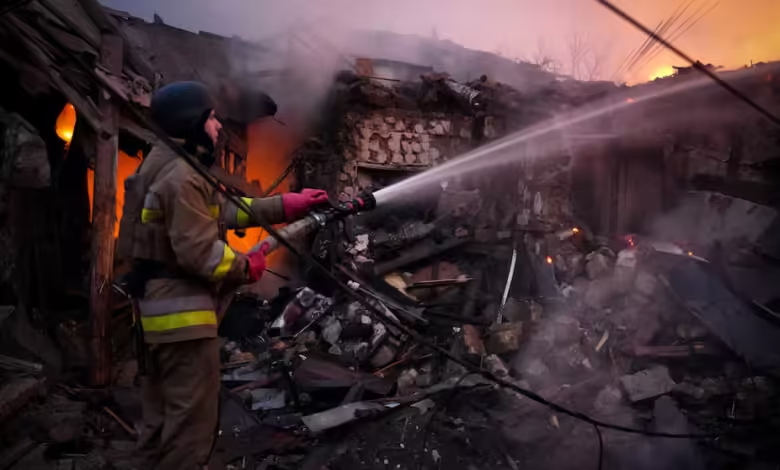Russia Launches Massive Missile Strike on Ukraine’s Power Grid as Winter Sets In

Kyiv, Ukraine (Nov 17, 2024) — In one of the most intense missile barrages since August, Russia launched a wide-scale attack targeting Ukraine’s power infrastructure early Sunday. The assault comes just as winter begins to tighten its grip, threatening to plunge millions of Ukrainians into darkness and cold as temperatures drop. Explosions were heard across major cities, including Kyiv, Odesa, Zaporizhzhia, and Mykolaiv, with reports of casualties and significant disruptions.
Overview of the Attack
The missile and drone strikes, described by Ukrainian officials as one of the largest air assaults in recent months, targeted electricity generation and transmission facilities across the country. Ukrainian Energy Minister German Galushchenko announced on social media that the country’s energy system was under heavy attack, emphasizing that critical infrastructure was the primary target.
“Another massive attack on the power system is underway,” Galushchenko stated. The assault, which included a combination of drones, cruise missiles, ballistic missiles, and hypersonic missiles, forced Ukrainian authorities to preemptively cut power in several regions, including Kyiv, Dnipropetrovsk, and Volyn, to prevent overloads and cascading failures.
Impact on Key Regions
- Kyiv: Multiple blasts were reported in the capital, causing fires in residential areas due to falling debris. Two people were reported injured, with emergency services rushing to contain the damage.
- Mykolaiv: The southern port city suffered drone attacks that left at least two people dead, according to regional officials.
- Odesa & Zaporizhzhia: Explosions rocked these strategic cities along the Black Sea coast, though the extent of the damage remains unclear.
- Volyn Region: Officials confirmed damage to energy infrastructure, though details were withheld due to security concerns.
Strategic Timing: Russia’s Winter Offensive
This attack appears to be part of a broader strategy by Russia to cripple Ukraine’s energy infrastructure as winter sets in, reminiscent of last year’s tactic aimed at demoralizing the population by creating long blackouts and cutting off heating supplies. Ukrainian cities have been bracing for such attacks, with residents stocking up on supplies in anticipation of harsh conditions.
Foreign Minister Andrii Sybiha condemned the strike, stating, “Russia launched one of the largest air attacks: drones and missiles against peaceful cities, sleeping civilians, critical infrastructure.” He suggested that the attack was a response to recent diplomatic engagements with Russia, notably targeting leaders like German Chancellor Olaf Scholz, who had just held his first phone conversation with President Putin since late 2022.
See also: Democrats Urge Biden to Sanction Israeli Officials Over West Bank Violence
Poland’s Response: Heightened Security on NATO’s Eastern Flank
In a dramatic escalation, Poland, a NATO member bordering Ukraine, activated its air force and raised its air defense systems to the highest state of readiness. According to a statement by Poland’s operational command, the country scrambled fighter jets and deployed ground-based radars as a precaution against any potential spillover from the conflict.
“This was a necessary response to the use of cruise and ballistic missiles so close to our border,” a Polish military official stated, emphasizing NATO’s commitment to safeguarding its airspace.
Psychological and Humanitarian Impact on Ukrainians
The renewed attacks have sparked widespread fear among Ukrainians, who vividly remember last winter’s power outages and heating shortages. In Kyiv, air raid sirens wailed through the night, urging residents to seek shelter as missiles rained down. Many families in high-rise apartments rushed to underground metro stations, now accustomed to using them as bomb shelters.
In a residential district in Kyiv, a 34-year-old mother, Anna Kovalenko, shared her fears: “We’ve been through this before, but every time the missiles come, it feels like we’re living in a nightmare. The winter makes it worse because we know the cold will be unbearable if the power goes out again.”
Military and Diplomatic Implications
This attack marks a shift in Russia’s military strategy, focusing once more on undermining Ukraine’s critical infrastructure rather than targeting military installations. Analysts believe the timing is significant, as it coincides with a potential diplomatic opening following Chancellor Scholz’s phone call with Putin. The missile barrage could be interpreted as Moscow’s way of reminding the West that it retains the ability to escalate the conflict at will.
The escalation comes at a critical juncture, with NATO allies considering additional military aid to Ukraine. The United States recently announced plans to provide advanced air defense systems, including Patriot missiles, to bolster Ukraine’s ability to protect its cities from aerial attacks.
International Reactions and Potential Consequences
Global reactions have been swift, with European Union leaders condemning the strikes as a blatant attack on civilian infrastructure. “Targeting energy facilities as winter begins is a deliberate attempt to inflict suffering on the Ukrainian people,” said Ursula von der Leyen, President of the European Commission.
The renewed bombardment could also influence ongoing discussions within the International Criminal Court (ICC) regarding potential war crimes charges against Russia. The deliberate targeting of civilian infrastructure is widely regarded as a violation of international humanitarian law, further isolating Moscow on the global stage.
Future Prospects: A Grim Winter Ahead
As Ukraine braces for a harsh winter, the latest missile strikes underscore the challenges of maintaining resilience amid relentless assaults. Despite international support, the country faces a grueling winter campaign as it battles not only on the front lines but also to keep its power grid and heating systems operational.
In an address to the nation, Ukrainian President Volodymyr Zelensky urged citizens to remain strong: “We are under attack, but we will not be broken. This winter, we will show the world our strength and unity.”
With no end to the conflict in sight, the coming months are likely to test the resolve of the Ukrainian people and the unity of their Western allies, as the struggle to defend Ukraine’s sovereignty continues against the backdrop of a harsh and unforgiving winter.
Critical Challenges for Ukraine: Keeping the Lights On
The latest wave of missile attacks raises significant concerns for Ukraine’s already strained power infrastructure. Energy Minister German Galushchenko warned that the country’s electricity grid, already weakened by previous strikes, faces severe stress as winter temperatures drop below freezing.
With millions of households relying on electricity for heating, the risk of prolonged blackouts is high. Ukrainian authorities have been working tirelessly to repair damaged substations and power lines, but continuous missile strikes threaten to undo much of their progress. The precautionary blackouts in Kyiv, Dnipropetrovsk, and other regions are a preemptive measure to avoid catastrophic damage to the grid.
Ukrenergo, Ukraine’s state energy company, has been in a race against time to shore up power supplies, while humanitarian agencies have mobilized to distribute blankets, generators, and heaters to vulnerable communities. However, with temperatures expected to plummet further in the coming weeks, the humanitarian crisis could worsen if energy supplies become scarce.
Economic Impact: War Drains Resources as Winter Approaches
The economic fallout from this latest wave of attacks is likely to be severe. Ukraine’s economy, already battered by nearly two years of war, faces additional strain as the government diverts resources to protect and repair critical infrastructure. Businesses are preparing for the worst, with many already suffering from supply chain disruptions and intermittent power cuts.
The agricultural sector, crucial to Ukraine’s economy, is particularly vulnerable. Extended blackouts could disrupt food processing facilities and cold storage, potentially leading to food shortages and further inflation. As Ukraine continues to be a major exporter of grain, any disruption could ripple through global markets, affecting food prices worldwide.
Russia’s Strategy: Turning Winter Into a Weapon
The missile barrage is part of what experts believe is Russia’s renewed strategy to weaponize winter against Ukraine. By targeting the country’s energy infrastructure, Moscow aims to undermine Ukrainian morale, hoping to pressure Kyiv into negotiations. This strategy mirrors the tactics used last winter, when Russia’s relentless attacks on energy facilities forced millions of Ukrainians to endure sub-zero temperatures without heat or electricity.
Military analyst Oleksandr Danylyuk explained, “Russia understands that it cannot achieve a swift military victory, so it’s resorting to these punitive measures. The goal is to exhaust Ukraine economically and psychologically.”
However, analysts also caution that this tactic could backfire. Ukraine has demonstrated remarkable resilience in previous winters, and the international community’s support remains robust. The European Union has already pledged additional financial assistance to help Ukraine stabilize its energy sector and procure emergency supplies.
NATO’s Role: Bolstering Ukraine’s Air Defenses
The intensification of Russia’s aerial assaults has reinvigorated calls within NATO for enhanced support to Ukraine. The recent attacks have highlighted gaps in Ukraine’s air defense systems, despite receiving modern equipment from Western allies. The delivery of additional systems, including Patriot missiles and NASAMS, is expected to be expedited to protect against incoming drones and missiles.
NATO Secretary-General Jens Stoltenberg reaffirmed the alliance’s commitment to supporting Ukraine: “As winter approaches, we will double down on our efforts to assist Ukraine. This includes providing more air defense systems to protect critical infrastructure.”
Poland’s decision to scramble its air force in response to the missile strikes reflects broader regional security concerns. Eastern European NATO members, particularly those bordering Ukraine, are on high alert as they seek to prevent any spillover from the conflict. The fear of stray missiles crossing into NATO territory, as seen in previous incidents, could trigger a larger crisis, given NATO’s collective defense obligations.
The Human Toll: Ukrainians Face a Harrowing Winter
For ordinary Ukrainians, the prospect of another harsh winter under the shadow of war is daunting. The psychological toll of living under constant threat of missile attacks, combined with the fear of losing heat, electricity, and water, is taking a heavy toll on the population.
Hospitals are bracing for an influx of patients as cold weather sets in, especially the elderly and those with chronic illnesses who are most vulnerable to the effects of freezing temperatures. The World Health Organization has warned that inadequate heating could lead to a surge in hypothermia and other cold-related illnesses, especially if Russia continues its attacks on energy infrastructure.
Amid the chaos, local communities are stepping up efforts to help each other. Volunteer groups in Kyiv have been distributing food, blankets, and portable heaters to those in need. “We survived last winter, and we will survive this one too,” said volunteer coordinator Iryna Kovalenko. “We will not let Russia break us.”
Diplomatic Implications: A Test for Western Unity
The latest missile strikes complicate ongoing diplomatic efforts to resolve the conflict. Ukrainian officials have been urging their Western allies to maintain pressure on Moscow, particularly as some European nations grapple with “war fatigue” and the economic costs of supporting Ukraine.
Germany’s Chancellor Olaf Scholz, who recently held a phone conversation with President Putin, is now facing criticism for engaging with Moscow. Ukraine views such talks with skepticism, fearing they may signal a softening stance by Europe.
Ukrainian Foreign Minister Andrii Sybiha pointedly remarked that Russia’s attack was a “response” to those seeking dialogue with Putin. “This is Moscow’s message: it doesn’t want peace, it wants submission,” Sybiha said.
Conclusion: A Long, Cold Winter Ahead
As winter sets in, Ukraine faces one of its most challenging periods since the war began. The latest missile strikes highlight Russia’s strategy of leveraging the cold weather to break Ukraine’s resolve. However, the spirit of resistance among Ukrainians remains unbroken, bolstered by continued Western support.
The next few months will be critical. The Ukrainian government, with international assistance, is racing to repair and protect its infrastructure while ensuring that its people are not left to face the harsh winter without basic necessities. For now, the resolve of both Ukraine and its allies will be tested as they navigate the treacherous path ahead.
The world watches closely, knowing that the outcome of this winter may shape the trajectory of the conflict and the region’s future for years to come.



